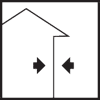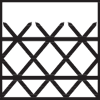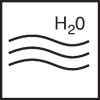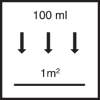Article No. 4200360001
Highly opaque, water-based weather protection paint
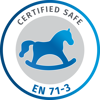
Product specifications
The stated values represent typical product characteristics and are not to be construed as binding product specifications.
Field of application
- For use on interior and exterior wood
- Wood building elements with limited dimensional stability, e.g. folding shutters, matchboarding, summerhouses
- Wood building elements with no dimensional stability: e.g. fences, framework, carports, planking
- Primer, intermediate and finishing coats
- Zinc roof gutters and zinc sheet metal
- Many other different substrates
Properties
- Highly opaque
- Elastic
- Does not flake
- Alkali-resistant, including when used on mineral substrates
- Weatherproof and moisture-regulating
- Low solvent, mild odour
-
Preparation
-
Substrate requirements
Wood building elements with limited or no dimensional stability: wood moisture content max. 18%
-
Preparations
Thoroughly remove any dirt, grease and non-adhering old coatings.
Wood substrates:
Sand grey and weathered wood surfaces down to sound, bright wood.
Remove loose and torn knots as well as resin that bleeds and clean with a suitable product (e.g. Remmers thinner & brush cleaner).
Exterior wood that needs to be protected against soft rot and blue stain must be pre-treated with a suitable wood preservative* (*Use biocides safely. Always read the label and product information before use).
Observe BFS Code of Practice No. 18 "Coatings on Wood and Wooden Working Materials in Outdoor Areas".
To prevent coloured substances contained in the wood from bleeding through white or light-coloured versions of this product, prime using Sealing Primer.
To avoid bleeding of substances in the wood into adjoining building elements (e.g. infilling in framework areas), treat the wood all round.
Old weathered carbolineum coatings can only be coated with dark colours. Always test first with a trial coating.
Zinc (galvanised steel):
Clean with an ammonium-based wetting agent, using an abrasive pad. Observe BFS Code of Practice No. 5.
Pre-treat with All Primer if the substrate is exposed to increased mechanical stresses.
Mineral substrates:
The substrate must be stable, dry, clean, free from dust and cracks (except hairline cracks), and free from harmful salts. Completely remove any non-load-bearing old coatings. Prime stable mineral substrates and sanding but firmly adhering substrates with Primer Hydro HF.
-
-
Application
-
Stir well and apply quickly using a brush or roller.
Observe the waiting times between coats.
Seal opened containers well and use contents as soon as possible.
-
Application instructions
-
Check colour, adhesion and compatibility with the substrate by setting up a trial area.
Before coating technically modified woods and wood-based materials, apply the product to a trial surface and conduct a suitability test on the desired area of use.
Cut end-grain surfaces at the bottom to create a water-drip edge.
End-grain wood preservative should first be applied to end-grain wood and cut surfaces in order to protect them against moisture.
Paint-on-paint contact, e.g. stacking, should be avoided.
The colour shown on the sample does not appear until the material has dried.
Do not use on wood impregnated with boron salts.
Ensure sufficient ventilation when applying indoors.
-
Drying
2-4 hours at 20 °C and 65% relative humidity.
Low temperatures, poor ventilation and high humidity delay drying.
-
Thinning
Ready to use
-
Working tools / cleaning
-
Paintbrush with synthetic bristles, flat brush, mohair roller
Clean tools immediately after use with water and detergent.
Ensure that any residue from cleaning is disposed of correctly.
-
Storage / shelf life
-
If stored unopened in its original container in a cool, dry place and protected against frost, the product will keep for at least 24 months.
-
Usage
-
100 ml/m² per coat
-
See application examples for different application rates depending on the substrate
-
Application examples
-
Application
examplesImpreg-
nationPrimer
Intermediate
coatFinishing
coatWood substrates:
Untreated wood, old weathered wood substrates, maintenance coats on dispersion paints and varnishes as well as translucent coatings with a wood preservativeIf necessary with Wood Preservative Primer* (exteriors only) Sealing Primer or Finishing Paint Sealing Primer or Finishing Paint Finishing Paint Zinc (galvanised steel):
Zinc, galvanised steel and rigid PVC, maintenance coating on old coats-- Universal Primer Finishing Paint Finishing Paint Mineral substrates: Weathered fibrated cement -- 1-2 x Primer Hydro HF Finishing Paint Finishing Paint Fair-faced concrete, pore-free concrete -- Primer Hydro HF Finishing Paint diluted with 10% water Finishing Paint Old renders, exterior (sanding/load-bearing renders) -- Treat stable, sanding and chalking renders with Primer Hydro HF Finishing Paint diluted with 10% water Finishing Paint Load-bearing renders, interior (gypsum renders, lime mortar renders, fair-faced concrete) -- Finishing Paint diluted with 10% water
-- Finishing Paint Maintenance coatings on old coats of dispersion paints, synthetic renders, oil-based coatings and varnishes -- Treat chalking coatings with Primer Hydro HF Finishing Paint diluted with 10% water Finishing Paint Gypsum plasterboard -- Primer Hydro HF Finishing Paint Finishing Paint Wallpaper, rough fibre wallpaper, etc. -- Finishing Paint -- Finishing Paint
-
-
General information
-
DIN EN 71-3 "Migration of certain elements":
This product complies with the limits for the migration of heavy metals to children's toys according to DIN EN 71-3 and thus fulfils one of several further requirements for the safety of children's toys according to the EU "Toy Directive" (2009/48/EC).On planed larch and softwoods with a high resin content, the coating may have reduced adhesion and resistance to weathering. This is especially the case on horizontal year rings, knots and areas of winter growth that are high in resin. Maintenance and renovation must be carried out more frequently on these surfaces.
The only remedy for this is pre-weathering or very coarse sanding (P80).
If these wood types are rough-sawn, considerably longer maintenance and renovation intervals are to be expected.Observe the regulations concerning design principles for wood protection.
Do not use on horizontal surfaces without drainage slopes and without edge radius, avoid accumulated moisture.
-
-
Disposal instructions
-
Larger quantities of leftover product should be disposed of in the original containers in accordance with the applicable regulations. Completely empty, clean containers should be recycled. Do not dispose of together with household waste. Do not allow to enter the sewage system. Do not empty into drains.
-
-
Safety / regulations
-
For further information on the safety aspects of transporting, storing and handling the product and on disposal and environmental matters, please see the current Safety Data Sheet.
-



